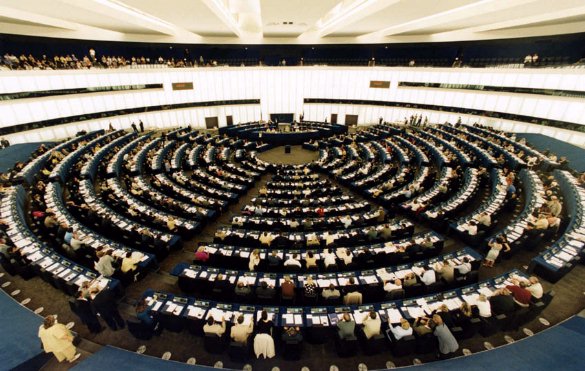Democrat November-December 2008 (Number 111)
How the EU Operates
The European Parliament
An expensive fig leaf misnamed 'democracy'
This institution first appeared as an ad hoc consultative assembly of the European Coal and Steel Community (ECSC) in 1952. This consisted of 78 members from national parliaments. The institution’s first task was to draft a treaty for a European Defence Community which the French national parliament rejected. The 1957 Rome Treaty established two further ‘communities’, the European Economic Community (EEC) and Euratom. All three communities had an executive each and ‘shared’ the Assembly. The three communities were later merged together.

The Assembly renamed itself ‘European Parliamentary Assembly’ but had no powers beyond consultation. In 1970 the Assembly gained powers to oversee the Budget and in 1975 was able to reject the whole Budget but at no stage able to write one. The European Commission is appointed by common accord by governments of member States but can be sacked by the European Parliament.
In 1979 the Assembly was directly elected. A common proportional voting system was used in 2004 across the Community including within Britain. There are currently 785 MEPs with Britain sending 78 MEPs. They sit in EU wide political groups. Groups over a particular size receive monies for activity and privileges including meeting rooms. MEPs from Britain number one in ten of all MEPs and a minority in each group.
The largest groups are the European People’s Party-European Democrats (EPP-ED) with 278 seats, which the Conservative party belongs to, and the Party of European Socialists (PES) with 216 seats, which the Labour Party takes part in. The Liberal group (ALDE) has 104 MEPs, the European United Left/Nordic Green Left group has 41 and the Independence/Democracy group which includes UKIP has 24 MEPs.
The official seat of the European Parliament is Strasbourg where it meets for 12 four day plenary sessions. The Parliament also meets in Brussels for committee, group meetings and complementary sessions. The administration takes place in Luxembourg. Each MEP’s papers are housed in a trunk which is transported back and forth in a lorry fleet between Brussels and Strasbourg. All 785 trunks have to be in place before business can take place.
The current institution has 5,900 staff, most of whom are interpreters. That is around eight people per MEP. MEPs are paid the same as national MPs plus very generous allowances. The role of MEPs is to act as ambassadors for the EU.
Although called a parliament this institution remains an assembly – an expensive talking shop which in reality only has influence and virtually no powers. The European Parliament is not part of the Executive. Following the Treaty known as the Single European Act the EP is required to give assent to treaties and accession of new Member States. The European Parliament cannot raise taxes, write the Budget, raise an armed force or a police force, does not control the mint or the European Central Bank. The Parliament cannot initiate legislation but does ‘co-decide’ with the Council of Ministers on legislation which emanates from the Commission. Legislation can be blocked by the Parliament but this can be got around by the Commission representing this in an amended form.
The European Parliament is deliberately placed first in the list of EU institutions to aid the impression the EU is democratic. Democracy does not work between nation states only within them. Democracy requires acceptance by minorities of majority decisions, the transfer of taxes from rich people and regions to poor people and regions. To sum up, the European Parliament does not have any powers and is an expensive fig leaf named democracy. The electorate has no power via the European Parliament to kick out those who govern us at the EU level. Those who are critical of or opposed to Britain’s membership of the EU must support the call for a boycott of the European Parliament elections in June 2009.
See also CAEF AGM Political Resolution